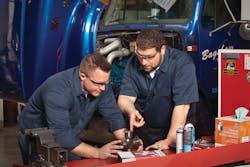I am going to do something that may be shocking to some. I am going to downplay the role of training in employee development.
This is not to say that training isn't important, but that training should always be thought of as a means to an end, and not the end itself.
I have previously written about the importance of post-training follow-up which includes reinforcement after training, including coaching, ensuring that the trainee is assigned related real-world tasks and providing feedback to the employee as he or she performs new tasks.
I have also written about aligning training with your overall talent management and progression strategies.
Putting these together, what we're really talking about is making sure the trainee has a means to develop necessary competencies for optimal work performance.
The Concept of Competency
The word "competency" can be a bit abstract. Certainly, we want to develop employees who are fully competent at their jobs, having the required skills and knowledge for the position.
Most companies need to continue to develop competencies for employee progression in order to fill higher-level positions that may be vacated through promotion, attrition or retirement.
But what do we really mean when discussing the development of competencies? In a word: experience.
Series of Experiences
Ask any hiring manager what they are looking for in filling positions above entry-level and the first word out of his or her mouth is likely to be "experience," not "competency." Thus, we need to start thinking about talent development as a series of experiences.
Using the list of experiences we would typically list to publish a job opening can often provide a much clearer path for talent progression than the more frequently used competency models.
Marc Effron at The Talent Strategy Group, a company involved in accelerating e talent growth (www.talentstrategygroup.com), simplifies this concept into Experience Maps. In a recent article, he writes: "An Experience Map accelerates job and career development by defining the specific experiences needed to excel in a role or function."1
Whereas a competency model may list abstract concepts ("strategic thinking" or "ability to lead teams,") the Experience Map emphasizes specific outcomes ("organize a team to bring the shop to ISO9000 standards" or "develop a monthly budget for the maintenance department.")
Development Tasks
How to implement the tasks through which the employee will gain experience is a key factor. The first few times through new tasks require coaching and guidance.
Simply throwing the employee into a sink-or-swim situation can have adverse effects in terms of safety, quality and customer service.
Identifying the needed experiences for a talent progression path can take some time, but is another crucial step. Start by interviewing employees currently in certain higher-level positions and get them to list the external and internal experiences that got them to where they are.
Too many times when looking at career paths, managers only identify the additional training needed. Where there are gaps in skills or knowledge, training is certainly a viable and necessary function.
But don't overlook the real-world experiences that are also necessary. In this way, you can start converting your Employee Development Plans over to Employee Experience Plans.
1 Effron, Marc. "Using Experience Maps to Accelerate Talent Development." (The Experience Map concept was originally tested at Avon Products by Paige Ross and Marc Effron, with the assistance of Karen Caswell.)
About the Author

Stephen Howe
Manager, Maintenance and Technical Training, United Rentals
Stephen Howe is manager of maintenance and technical training for United Rentals. www.unitedrentals.com. Founded in 1997, United Rentals is the largest equipment rental company in the world, with an integrated network of more than 850 rental locations throughout the United States and Canada. Howe is a past president of the Automotive Training Managers Council (ATMC), a global organization of training managers from automotive aftermarket, OEM, supplier, service tool and training companies. www.atmc.org.
